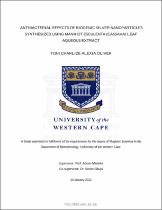| dc.contributor.advisor | Madiehe, Abram | |
| dc.contributor.author | Oliver, Toni Charlize Alexia | |
| dc.date.accessioned | 2023-08-11T07:21:23Z | |
| dc.date.available | 2023-08-11T07:21:23Z | |
| dc.date.issued | 2023 | |
| dc.identifier.uri | http://hdl.handle.net/11394/10472 | |
| dc.description | >Magister Scientiae - MSc | en_US |
| dc.description.abstract | Antimicrobial resistance (AMR) is a growing global health concern that poses a serious threat to the health of humans, animals, and plants. The major public health problem of AMR is primarily caused by the incorrect use of antibiotics, which is further compounded by the reduced novel antibiotics discovery rate. AMR bacteria cause infections that are difficult to treat, resulting in prolonged hospital stays and increased healthcare costs. Moreover, AMR is associated with a high risk of morbidity and mortality. Current therapeutic strategies for AMR infections are often inefficacious, associated with side effects, and may further exacerbate AMR. Therefore, there is an urgent need to develop alternative strategies to treat AMR bacterial infections. | en_US |
| dc.language.iso | en | en_US |
| dc.publisher | University of the Western Cape | en_US |
| dc.subject | Bacterial infections | en_US |
| dc.subject | Antimicrobial resistance | en_US |
| dc.subject | Antibiotic-resistant | en_US |
| dc.subject | Antibacterial activity | en_US |
| dc.subject | ESKAPE | en_US |
| dc.title | Antibacterial effects of biogenic silver nanoparticles synthesized using manihot esculenta (cassava) leaf aqueous extract | en_US |
| dc.rights.holder | University of the Western Cape | en_US |

